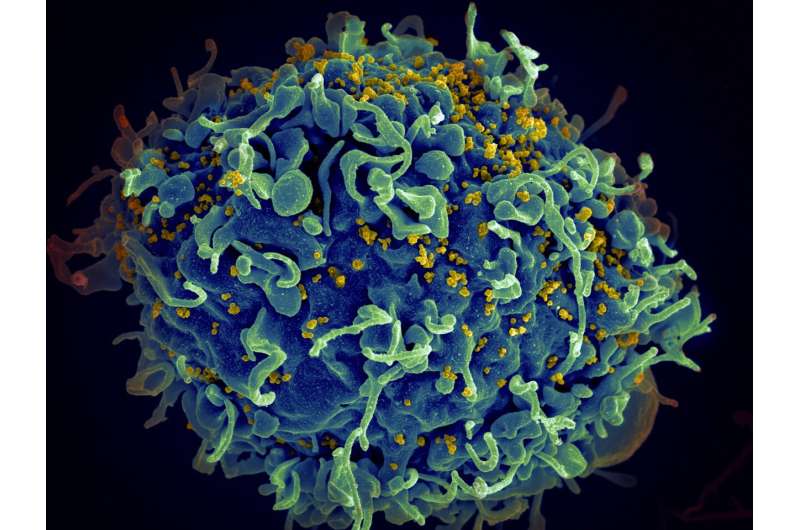
New research has found HIV is 2.5 times more frequent in people who use mental health services than the general population in South London. The paper was published today in BMJ Open.
HIV is 2.5 times more common in people who use mental health services than the general population in South London.
The researchers, at King’s College London, found that 2.5% of people who have had contact with mental health services had a recorded diagnosis of HIV. This equates to a diagnosed HIV rate of 24.7 people per 1,000 people. The prevalence of HIV in the general population living in Lambeth, Southwark, Lewisham and Croydon (approximately 1.3 million residents) in 2019 was approximately 10 per 1,000.
Dr. Margaret Heslin, Senior Lecturer in Health Economics and Epidemiology, Institute of Psychiatry, Psychology & Neuroscience at King’s College London, and first author, said, “The relationship between HIV and mental illness is a complex one. The increased prevalence could be a real increase resulting from people with mental health needs being more at risk of acquiring HIV, or from people with HIV being more likely to develop a mental illness, or a combination of both.”
“Future work should include examination of risk factors for HIV in people in contact with mental health services so we can think about how to reduce the risk in this group. Additionally, we know that people with mental illness often receive worse physical health care than the general population, so we need to examine whether people with mental illness and HIV get the same standard of HIV care as the rest of the population.”
The researchers explored the prevalence of documented Human Immunodeficiency Virus (HIV) infection in people who have had contact with mental health services, by linking electronic data. They used the Clinical Record Interactive Search tool (CRIS) at the NIHR Maudsley Biomedical Research Centre (BRC) to match data collected routinely by mental health services in South London with pseudonymized national HIV data held by the UK Health Security Agency (UKHSA).
Although all people in the cohort had contact with secondary mental health services, 27% of people identified with HIV had no formal mental health diagnosis.
The largest mental health diagnostic group was:
- substance disorders with 18% of the sample,
- followed by mood disorders (15%),
- neurotic and stress related disorders (13%)
- and people with unspecified mental health diagnoses (12%).
Need for integrated care between HIV and mental health services
Liz Hughes, Professor of Nursing, Edinburgh Napier University, and an author on the paper said, “People with mental illness experience poorer physical health compared with those without mental illness. There has been some fantastic initiatives in NHS mental health services to reduce the health disparity. However, these have mainly focused on cardiovascular and metabolic conditions (such as type 2 diabetes).
“Previous research has indicated that mental health staff have poor knowledge in relation to sexual health. They have low confidence in their skills in having conversations about risks of HIV and other infections.
“Our findings provide evidence for the first time in a UK setting, that people who use mental health services have elevated risk of HIV infection. It is vitally important that sexual health and blood borne viruses are addressed as part of the overall response to improving the physical well-being of people who experience mental health issues.”
Professor Robert Stewart, NIHR Maudsley BRC Informatics deputy lead, and an author on the paper adds, “This is the first attempt to link clinical mental health and national HIV data to investigate HIV in secondary mental health service users in the UK. We have been working for over 15 years at the NIHR Maudsley BRC to highlight the physical health inequalities faced by people who used mental health services. The fragmentation of health records is a major challenge, but the Maudsley’s Clinical Data Linkage Service has achieved an internationally unique network of linked information sources to allow these sorts of questions to be answered.”
More information:
Margaret Heslin et al, Prevalence of HIV in Mental Health Service Users: a Retrospective Cohort Study, BMJ Open (2023). DOI: 10.1136/bmjopen-2022-067337
Citation:
Higher rates of HIV diagnoses found among mental health service users (2023, April 25)
retrieved 26 April 2023
from https://medicalxpress.com/news/2023-04-higher-hiv-mental-health-users.html
This document is subject to copyright. Apart from any fair dealing for the purpose of private study or research, no
part may be reproduced without the written permission. The content is provided for information purposes only.


